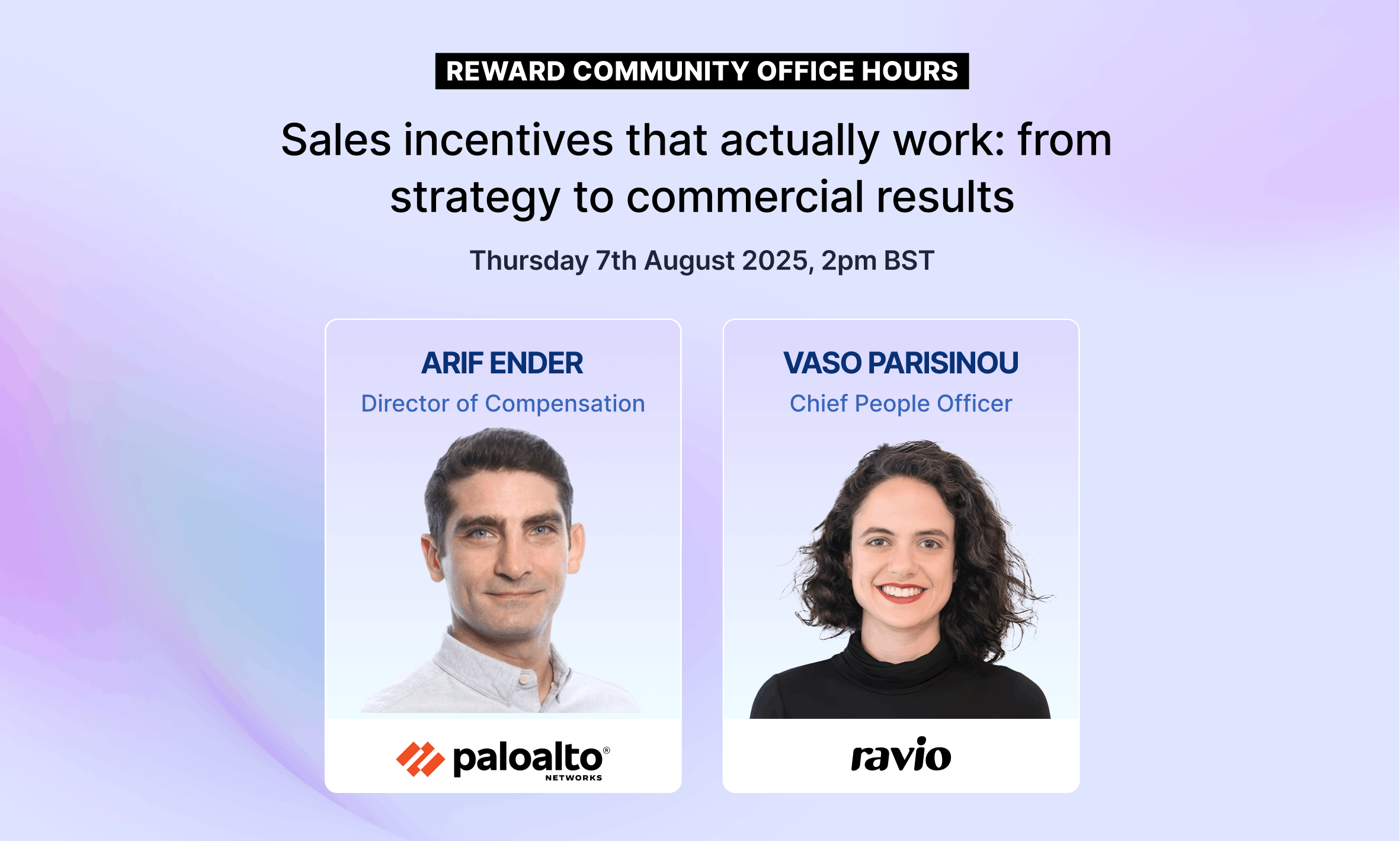Sales incentive plans are expensive (often representing 20-30% of total sales costs) so they need proven ROI. But many companies struggle to design plans that actually drive the behaviours and results they need.
From balancing individual versus team targets to preventing quota gaming as teams scale – the challenges of effective sales incentive design are complex and costly to get wrong.
In this Ravio Reward Hour, Arif Ender, Director of Compensation at Palo Alto Networks, joined Vaso Parisinou, Chief People Officer at Ravio, to explore practical approaches to designing sales incentive plans that deliver real commercial impact – drawing insights from Palo Alto Networks' journey of scaling from startup to over $7 billion in revenue.
What you’ll learn:
- How to decide between commission structures, bonus payouts, accelerators, team-based targets – figuring out what actually drives results
- How to adapt sales incentives as your company scales – from shifting business models, to teams expanding across the globe, to roles becoming increasingly specialised
- How to maintain compensation fairness between variable pay sales roles with upside potential, and fixed salary employees.
Whether you're designing your first sales incentive plan, optimising an existing one, or preparing for growth, this session will provide actionable insights from a Reward Leader with lived experience navigating these challenges.
Key takeaways from the webinar
Key takeaway 1: Sales incentive strategy must cascade from business strategy
One of Arif's core principles is that sales compensation can't exist in isolation, it must directly support broader business goals and priorities.
"If you’re a for-profit company, then making sales means generating revenue – so the strategy for sales incentives has to be linked to what you want to accomplish as a business.”
If your focus is geographical expansion, your sales compensation might incentivise territory development or penetrating new markets. But if the priority for the year is a new product launch, the sales incentives might focus on driving adoption behaviours.
The compensation plan becomes a lever for executing business strategy, not just a cost centre.
💡 Practical application: Before launching any sales incentive plan, clearly articulate how it supports your specific business objectives. Every element of the plan should trace back to a strategic goal – if it doesn’t, you might need to go back to the drawing board.
Key takeaway 2: Clarify your distinct sales personas, and design mechanisms with psychology in mind
As companies grow and expand their features and products, the sales team will also grow – and it’s typical for new roles and specialisms to be added. For instance, smaller companies may have only SDRs and Account Executives – but at scale there may be specialists focused on Field Sales, Inside Sales, Renewal Management, and so on.
In terms of sales compensation, this means it becomes important to maintain clear distinctions about the different sales ‘personas’ that exist within the organisation – because they will likely require different methods of incentivisation.
For instance, Arif emphasised the psychological distinction between "hunters" and "gatherers" – those acquiring new logos versus those managing renewals.
A sales manager focused on ‘hunting’ new business might have a high ratio of variable compensation compared to their base (a 50-50 split for instance) to provide significant motivation to build relationships in new and uncertain markets.
On the other hand, a ‘gatherer’ might have a lower variable component that is tied to retention rates and expansion revenue.
Key takeaway 3: Transparency and clear eligibility criteria prevent internal equity disasters
Arif identified one critical failure point: inconsistent commission eligibility for similar roles.
"If I see two account executives, and one of them is commission eligible whilst the other is not, this is a big red flag. That should never happen."
To avoid this, it’s very important that the principles behind what makes a role commission eligible are clearly documented, and that line managers and leaders are regularly trained on this information to avoid any inconsistencies – especially at larger companies.
Arif also highlighted the importance of building transparency within the sales organisation about the approach. Employees should all know the “rules of engagement” that determine what they can earn, because it defines their earning potential and career progression with the company.
Key takeaway 4: Long sales cycles don’t mean long payout periods
For companies with long sales cycles (12 to 18 months), the instinct might be to align payout frequency with the sales cycle, with an annual bonus payout, for instance.
Arif strongly disagreed with this approach.
The reality of B2B enterprise sales, particularly in the cybersecurity space that Arif currently works in at Palo Alto Networks, is that building trust takes significant time and effort.
As Arif explained: "It takes time… a long time to build the trust that people need to buy your product – especially in cybersecurity where you’re talking about protecting the secrets and confidentiality of the companies who are buying the product.”
That relationship and trust-building involves a lot of work, and relying on an annual payout to motivate that effort can be a mistake: “You can’t let them wait that long, they won’t buy that.”
Instead, he recommends that companies should consider:
- More frequent payouts related to key milestones in the sales process (e.g. pipeline generation, pipeline progression through lifecycle stages, engagement metrics)
- Carefully designed payout curves that account for the longer cycle – less steep curves for below target (but still rewarding that consistent activity) and steep rewards when sales executives actually succeed in moving deals through the lengthy process.



